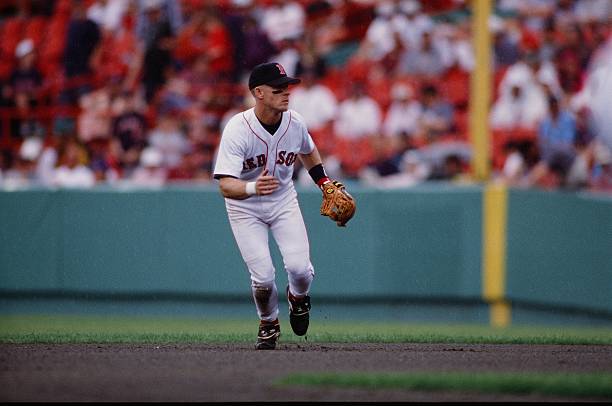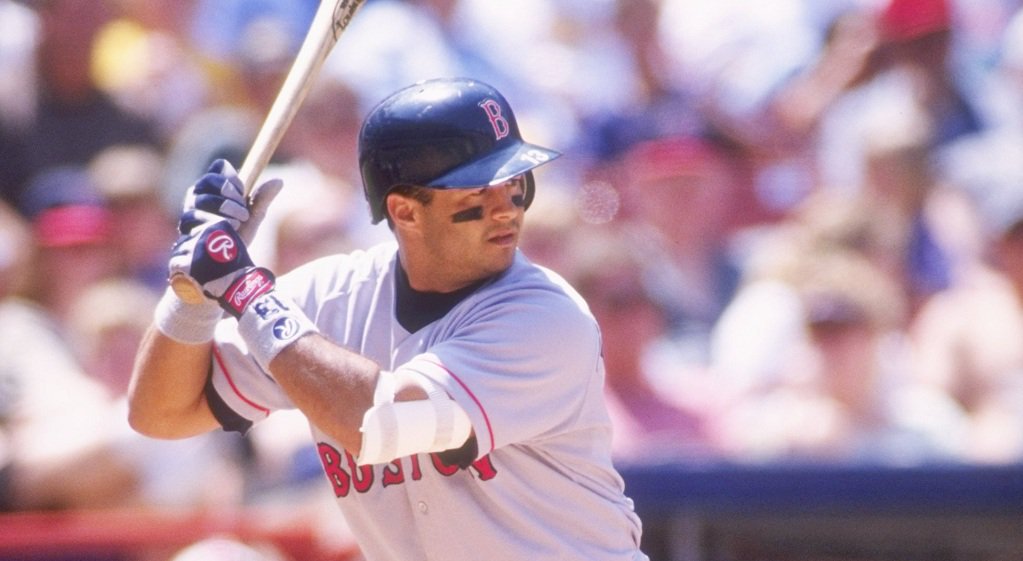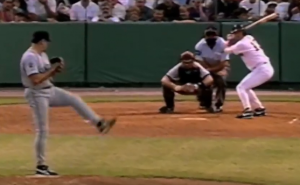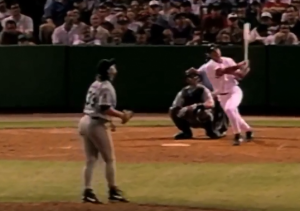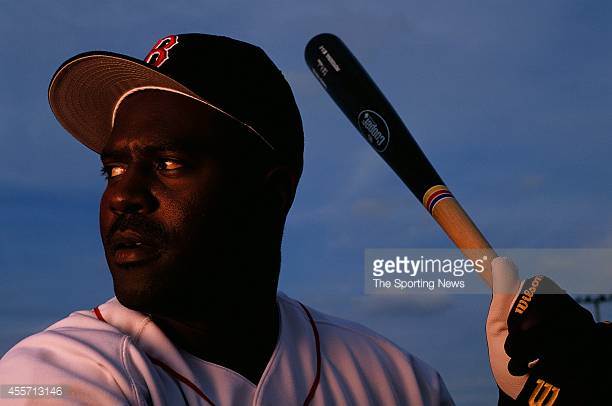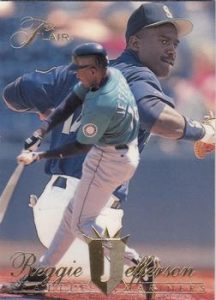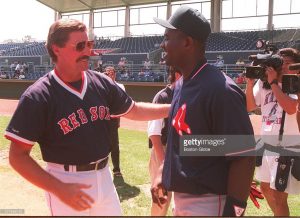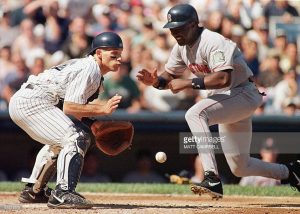I had the pleasure of chatting with former Red Sox second baseman Jeff Frye. Frye played in the Major Leagues for eight seasons, three of which came in Boston. He was a career .290 hitter, .295 with the Red Sox. Nowadays, Frye works as a sports agent at Frye McCann Sports and does some pre and postgame work for the Texas Rangers.
BSE: You began your career as a 30th round draft pick; what was it like clawing your way up to the Majors?
Jeff Frye: I never even thought I really had a chance of making it to the Majors to be honest. Every Spring Training I would drive down from Oklahoma with my buddies and wonder if this was the year I was getting released. Obviously, everybody’s goal is to play in the Major Leagues, but when you’re a 30th round draft pick and you don’t even start really your first season, it’s not looking too promising.
BSE: I actually saw a video of you online talking about how you changed your stance and upped your offensive production. That was pretty neat to see.
Jeff Frye: It was kind of a fluke deal. I’d done really well in A-Ball, won the batting title in low A-Ball and hit like .270 in high A-Ball. Went to AA and the defense was so much better, and the pitching was so much better at AA and I was struggling for probably two months. Just goofing around one evening after a game in the hotel, and I was imitating a lot of the Rangers star players at the time, Ruben Sierra and Juan Gonzalez, they had big leg kicks. I was imitating those guys and the guy I was playing with, who was actually my roommate, Rick Wrona, he says why don’t you hit like that in a game? The next day I started hitting that way and man, it gave me a huge boost in confidence. I started hitting, I could drive the ball and had more leverage. I just kept doing that the rest of my career.
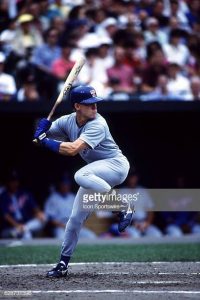
BSE: There’s been a lot of talk lately about the pay for Minor Leaguers, do you think they need to be doing something about that?
Jeff Frye: Yeah, I mean they should’ve done something about it a long time ago. My first year was 1988, and I started out at $700 a month. The Major League minimum was right around $100,000, or 109,000, something like that. Now the minimum’s over $500,000 and starting pay for a first year Minor Leaguer is $1,100 [a month]. It hasn’t progressed.
BSE: You made it to the Major Leagues in 1992 and played a decent amount. Your first Major League home run was actually leading off a game.
Jeff Frye: It’s actually funny, way back in 1992 there weren’t too many games on tv. I think it was a Saturday game, one of the few games that was actually televised. I actually led off the game off Arthur Rhodes with a home run. Our game actually wasn’t the one they were covering, but they clicked over and showed the start of our game. I actually became friends with Arthur Rhodes after that.
BSE: You missed all of ’93 right?
Jeff Frye: Yep, offseason basketball injury. I was playing basketball and tore my ACL, and I kind of lied about what happened to the Rangers. I didn’t have a guaranteed contract so I told them I was jogging.
BSE: In 1994 you came back and batted .327, you had a good season in ’95 and played in 90 games. How come you were in AAA in ’96 for Texas?
Jeff Frye: Well, the new manager they brought over, Johnny Oates from Baltimore, wasn’t a big fan of mine for some reason. He brought Mark McLemore over from Baltimore with him, who also played second base. He was trying to get his guy in there, the guy he felt comfortable with, and I felt like I had earned the spot with what I’d done the year before. Toward the end of the [’95] season I was so frustrated I went on a radio show and the guys were asking me what was going on. I told them how I felt and the Rangers got word of it; Johnny Oates got word of it, and I was pretty much banished after that.
BSE: You were released in June of 1996 and the Red Sox picked you up the very same day, so they must have seen something in you.
Jeff Frye: It was an arranged deal. Billy Martin Jr. is a longtime friend of mine, Billy Martin’s son, he was representing Kevin Kennedy. He called Kennedy up, the Red Sox were struggling, I think they had Wil Cordero and Jeff Manto playing second. Kennedy was looking for a second baseman and he was familiar with me. Billy Martin Jr. said, “well hey, the guy you need is in AAA.” So, they inquired about me, and the Rangers had the choice of either calling me up to the big leagues or letting me go, so they ended up letting me go.
BSE: Your Sox debut was the same day John Valentin hit for the cycle.
Jeff Frye: Funny thing is, Val and I played together in the Jayhawk League, a collegiate league back in the day. He came down to Fort Smith, Arkansas to play for our team. I grew up in Oklahoma so I was playing for that team and we became friends and then we were teammates in Boston….He taught me a lot, I was really raw. I hadn’t had much coaching to that point, I mean a routine grounder to second base was a bang-bang play at first, I didn’t know to charge the ball. Working with Val, he taught me a lot.
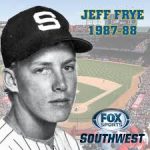
BSE: You mentioned how the Red Sox were struggling when they got you; they were 22-34. Went 63-43 afterwards and if I remember correctly had the best record in baseball after the All-Star Break.
Jeff Frye: Yeah, we had a great combination of me and Darren Bragg at the top of the lineup. I told Kevin Kennedy, I want to hit and run every single time there’s a runner on first base. I asked him if he’d allow me to put on my own hit and run with Darren Bragg, which doesn’t happen very often, you know? So, I developed a sign with Darren Bragg…because he was always hitting in front of me. I bet I had 30 base hits that year on hit and run, with Braggy running and me just hitting the ball in the hole.
BSE: I had Kevin Kennedy comment to me once about the rejuvenated team in the second half and he singled out you, Bragg and Reggie Jefferson for key contributors to that run.
Jeff Frye: Reggie was a hitting machine, we called him “the Hit Cat.” He was the one guy that I’ve ever seen…that actually worked on hitting the ball in batting practice to where it’d be a hit in the game. I’d never heard of that before, I was just trying to hit the ball hard. He was a great hitter.
BSE: What were some of the big changes coming from Texas to Boston?
Jeff Frye: Obviously the temperature was a big change. I think probably the biggest change was the pressure that you played under, and the excitement level. I never really had that in Texas, when I was there, we were never really in a pennant race. Coming to Boston we had the rivalry with the Yankees.
BSE: Speaking of the Yankees, I think you were the one on base in front of Trot Nixon when he homered off Clemens in that big Pedro vs Clemens game, right?
Jeff Frye: Oh yeah, there’s a great story to that if you want to hear it.
BSE: Oh, absolutely!
Jeff Frye: The at-bat that I got on base I got an infield hit, but earlier in that at-bat there was a pitch in on me that hit the knob of the bat and I acted like it hit my hand. I was jumping around and waving my hand, and Jimy Williams came out and argued with the umpire. Jimy called me over, and my nickname was Frito, and he goes, “Frito, did he get you?”
“No Jimy.”
“Alright, good try!”
I ended up hitting a one-hopper off Clemens’ glove that he probably should have fielded, and they gave me an infield hit. Trot hits the homer, so we go to the bottom of the ninth, I think we had a two-run lead and they scored a run. Then they had the tying run on third, groundball to me, and I’m getting ready to throw to first base, game over, and I look and Mike Stanley stepped on the base and slipped and was almost falling down. So, I double-clutched, and threw, and barely got, I think Paul O’Neill, by half a step. Joe Morgan was even commentating, I think it was an ESPN game or something, he commented about it. So the next day I talked to him about it and he said, “Oh, I didn’t realize that.” If I had thrown it, initially, it would have gone right by him.
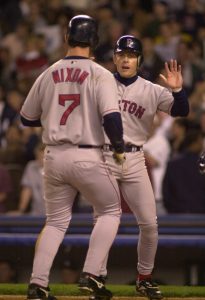
BSE: Any particular games from your playing career stand out?
Jeff Frye: The game where Darren Lewis and I hit back-to-back home runs in the ninth off Mike Trombley of the Twins in Fenway. He hit a home run to tie the game, then I hit a home run to walk-off the game. Two guys who aren’t known for hitting home runs. I remember the headline in the paper the next day; “Banjo Hitters Come Through for the Red Sox.”
In 2001 I hit for the cycle for the Blue Jays against the Rangers.
BSE: Second one in Toronto history.
Jeff Frye: Yeah, that was a little bit controversial because I could have had a double in my last at-bat but stopped at first. We were winning by nine runs in the eighth inning and I went up to Cito Gaston, who was our hitting coach, and said “what do I do here if I hit one into the corner, or the gap?” He said, “stop at first and tell them I told you to.” As I hit the ball I was so nervous. It was a really frustrating year for me, but to have the opportunity to hit for the cycle. I was always the guy who was unselfish, would move runners over and things like that. I finally had the chance in my career to do something a little bit selfish, instead of getting a double I stopped at first, man I got a lot of flak for it. The manager of the Rangers commented on it, and Tim Kurkjian.
BSE: I mean, it wasn’t a close game, what did they care?
Jeff Frye: Yeah, that’s kind of how I felt. Plus, I’d already asked Cito! Cito had already won four pennants as manager of the Blue Jays and two World Series, so.
BSE: I think the first base coach was yelling at you to stop too, right?
Jeff Frye: Yeah, Garth Iorg. I was screaming as I rounded first, “what do I do? What do I do?” And he goes, “stay here! Stay here!” So, I took a big turn and went back to first. Kelly Gruber walked onto the field, man it was a cool feeling.
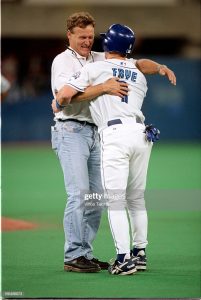
BSE: Was that your proudest accomplishment?
Jeff Frye: Yeah. I mean, I do remember a couple games in Boston when I first went there. I made an error on a routine groundball when Clemens was pitching. Man, the crowd was all over me and were yelling to go back to Texas. Not too long after that I had a game where I was 4-4 and I’d lined out my fifth at-bat and I got a standing ovation. One time Jimy Williams pinch-hit me for Trot Nixon. I was like, “man Jimy, are you sure?” They announced me in Boston, “now batting for Trot Nixon, Jeff Frye,” and the whole stadium booed. So, I’m walking to home plate, and I’m not happy, so I take my helmet off and tip it to the crowd as I’m walking to home plate. I got a base hit and got to first base and I tipped my hat to the crowd. I ended up scoring a run, and then I came up later in the game and hit a two-RBI double off the wall and they loved me.
BSE: Nowadays you are an agent for some of the ballplayers?
Jeff Frye: Yeah, I’ve been an agent for 17 years.
BSE: Wow, that’s a long time. You think your playing days helped in this position?
Jeff Frye: Yeah, definitely. A lot of stuff I do is amateur recruiting, so if I go in and talk to the family about their son, I can basically tell them everything their son is going to experience, I’ve already experienced. Not many other agents can make that claim.
BSE: With the way free agency has gone the past couple years, what are your thoughts on that? Do you think it needs any fixing?
Jeff Frye: Absolutely, something’s going on. Now that Bryce [Harper] and Manny [Machado] have signed it’s like everything is back to normal, but we still have so many great players who haven’t signed. We have difference makers who don’t have jobs and spring training is already going on. This has been a couple years running now. I don’t want to say there’s collusion, but I saw a story about Mark Reynolds, he didn’t have any offers from anybody, then one day within like an hour he had a call from four different teams and the same offer from every team.
BSE: That’s pretty fishy.
Jeff Frye: Yeah, something’s going on. I’m kind of fearful of what we’re facing in a couple years with the player’s and the commissioner’s office.
BSE: Any thoughts on some of the new rules in the game? The change of pace?
Jeff Frye: Yeah, I’m not a fan of that at all. I don’t think the pace of play is why people aren’t watching baseball. I had a hard time watching the playoffs last year, it’s boring with everyone striking out, walking or swinging for the fences. They aren’t cutting down on their swings with two strikes. The Red Sox weren’t that way last year and look what happened; I think Cora did a great job. I don’t think we can look at all these stats, launch angle and exit velocity and things, and measure how valuable a player is. I would have never had a chance, my exit velocity and launch angle wouldn’t even register. I was told to hit the ball on the ground. Nowadays you’re not supposed to hit the ball on the ground….You know last year was the first year in the history of baseball where there were more strike outs than hits? And the shift; they’re talking about eliminating the shift or limiting shifts. Well, if you see four guys on the right side of the infield, hit the ball the other way! Why cater to the guys who can’t make adjustments? He can’t hit the ball the other way so let’s change the rules so it benefits him. Well, that’s not how it’s supposed to work.
BSE: So, you mentioned you’re not a fan of the stats, so called stats, they use nowadays.
Jeff Frye: No, not at all; that’s an understatement. I go round and round with Brian Kenny. I haven’t delved too deep into what stats are put into WAR, but I’m pretty sure if I’m up with a runner on second and move the runner over to third, I don’t get much credit for that. If the next guy hits a groundball to second and gets an RBI, that’s because I helped him get that RBI. I should be credited in some fashion, it’s all about winning.
BSE: Yeah, it was designed initially to just be a tool to help determine how good someone was, not be an and-all-be-all. The problem is, some guys now treat it like gospel, if one guy has a higher WAR than another it automatically means he’s a better player. That’s the big problem with it.
Jeff Frye: Yeah, I remember Tim Naehring said to me one time, way back in the day, the three most important stats are hits, runs and RBI, and the best players in the game average more than two per game. So, any combination of hits, runs or RBI over the course of the season, and if you look at the numbers at the end of the year, the guys who are the best players at the end of the year have the highest percentage.
BSE: I remember a few years ago I was watching MLB Network, and two of the guys were having a big conversation about WAR while John Smoltz just stood there quietly. Right before commercial Smoltz slides in, “Jason Heyward has a higher WAR than Giancarlo Stanton, that’s all you need to know about WAR.” It was perfect, just casually makes a short statement that exemplified a part of the problem.
Jeff Frye: I watch that all the time too, he’s my favorite; he and Billy Ripken, neither one buys into that. Look at the contract the WAR stat got Jason Heyward, and how has that paid off? Immediately it was bad.
BSE: I don’t know if it was the year before he was a free agent, but Heyward hit maybe .276 with 13 homers and was a top 10 player in all of baseball according to WAR. (He hit .293 with 13 HR in 2015).
Jeff Frye: Yeah, because his defensive stats were so great.
BSE: Yeah, which is important, but how does it make you better than someone hitting .310 with 35 homers or something?
Jeff Frye: Yeah, well obviously it doesn’t because look at what’s happened since he signed.
BSE: One last thing, you’re doing some pre and postgame work for the Rangers, correct?
Jeff Frye: Yeah, I started last year on Fox Sports Southwest and I did like 17 games I think last year. I’m scheduled to do, I don’t know how many this year, but that’s been a lot of fun.
BSE: Well, that’s all the questions I have for you, anything you’d like to add?
Jeff Frye: Still a Red Sox fan, happy they won they won the World Series. I’ve reached out to the Red Sox because I’d…like to do their fantasy camp, I thought that’d be cool to get to see some of my old buddies, so maybe down the road I’ll get to do that.
BSE: Well, I appreciate you taking the time to talk with me today.
Jeff Frye: Yeah, no problem man.
Featured picture (Photo by Sporting News via Getty Images)
